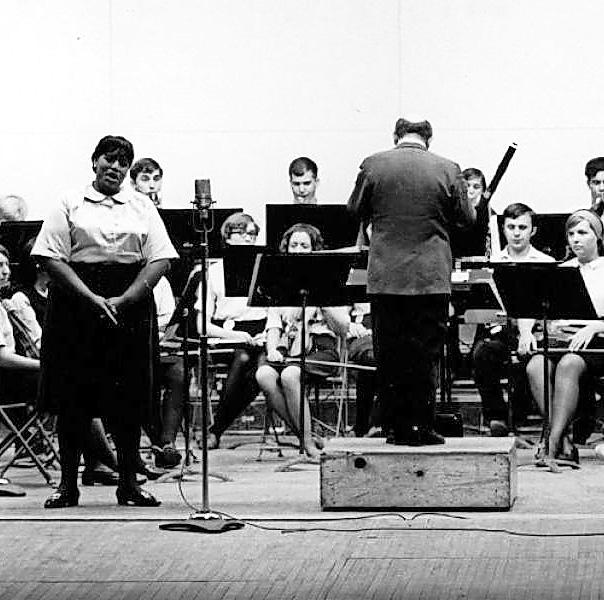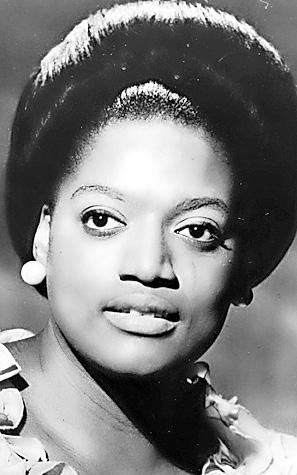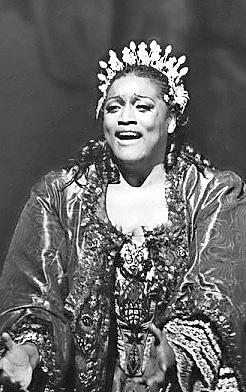
3 minute read
Literary Lives 12
from 11052021 WEEKEND
by tribune242
NORMAN sings Wagner’s Tannhäuser in Berlin in 1968. (Photo_Interlochen Centre for the Arts)
In 1975, at the age of thirty, Jessye Norman moved to London and disappeared from the opera stage for the next five years. The decision was never fully explained, but it was calculated to save her voice and to focus on her greatest strength – singing with and above a full orchestra. For the next half decade, she developed a healthy schedule as a concert soloist and solo recitalist.
Advertisement
Later, a 1983 recording of the Strauss Four Last Songs with Kurt Masur and the Gewandhaus Orchestra sealed her position as perhaps the foremost performer of orchestral Lieder.
She returned to the opera stage in 1980 with an insipid performance of Strauss’s Ariadne auf Naxos in Hamburg and London, that served chiefly to accentuate how uncomfortable she was moving about the stage.
A Met debut followed in 1982 in Berlioz’s Les Troyens, but opera gradually faded out of her agenda. At the end of the decade, she returned to live in the US and made the second decision that extended her career – a drop from soprano to mezzo. Given that the top notes were never her forte, this allowed her the freedom to explore the best facets of her remarkable instrument – warmth, deep colours and a lightness that took listeners often by surprise.
“I sing in languages that I speak. So when I’m singing a Schubert song, I know precisely what every word means and, you know, when it was composed and who was the poet ... and whether Strauss or Wagner or French Berlioz, Duparc or Debussy or whatever.”
- Jessye Norman
Norman was careful about her programme and selected her recitals innovatively. She commissioned woman-life-song by composer Judith Weir which premiered at Carnegie Hall together with texts by Toni Morrison, Maya Angelou and Clarissa Pinkola Estés.
A YOUNG Jessye Norman

“Norman has one of the most opulent voices before the public today, and, as discriminating listeners are aware, her performances are backed by extraordinary preparation, both musical and otherwise.”
- Allen Hughes The New York Times
On January 21, 1985, Norman was invited to sing at the second inauguration of US President Ronald Reagan, performing “Simple Gifts” from Aaron Copland’s Old American Songs. In 1986 she sang God Save the Queen for Queen Elizabeth’s 60th birthday celebration. That same year she was a soloist in Strauss’s Four Last Songs with the Berlin Philharmonic during their tour of the United States. Her interpretation of the Strauss creation was especially acclaimed as the tonal qualities of her voice were ideal for these final works in the great Romantic German Lieder tradition.
Over the years, Norman expanded her talent into less familiar areas. She sang Poulenc’s one-act opera La voix humane based on Jean Cocteau’s 1930 play of the same name. Right throughout the 1980s and ‘90s she produced numerous awardwinning recordings. In addition to opera, many of her performances focused on art songs, lieder, oratorios and orchestral works. performance that was repeated at the Metropolitan Opera that marked the Company’s first single-character production. It was presented in a double-bill with Norman playing Judith in Bartok’s Bluebeard’s Castle. Also, that same year, she was the featured soloist with Zubin Mehta and the New York Philharmonic in the opening concert of its 148th season – telecast live by PBS. She travelled to Hong Kong and performed at the Hong Kong Cultural Centre opening; and gave a recital at the National Theater and Concert Hall in Taipei.
She was much in demand, and in July 1989 was invited to sing the French National anthem La Marseillaise to celebrate the 200th anniversary of the French Revolution. She sang at the Place de la Concorde in Paris, in a costume designed by avant-garde designer Jean-Paul Goude. The event was the inspiration that led the South African poet Lawrence Mduduzi Ndlovu to write a poem titled “I Shall Be Heard” dedicated to Jessye Norman. The poem appears in Ndlovu’s book of poems In Quiet Realm.








